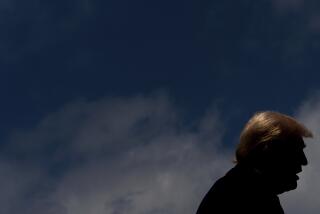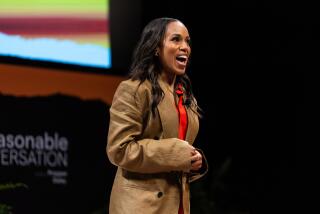Visit From Cold War’s Offspring
- Share via
It’s a hot combination on the benefit circuit: eat light, listen heavy.
In recent weeks, there was brunch before Harry Belafonte discussed prostate cancer, lunch before Elizabeth Dole bemoaned sliding American values, and supper before the Duchess of York talked about the plight of children in war-torn countries.
Tonight, lecture-lovers will get three for the price of one when Sergei Khrushchev, son of the late Soviet Premier Nikita Khrushchev, joins Julie Nixon Eisenhower and her husband, David Eisenhower, to discuss the Cold War era at the Irvine Barclay Theater.
Sponsored by the UCI Alumni Assn., the Irvine Co. and the Orange County Forum, the event will include a backstage supper for underwriters. On the menu: a curry soup served to the Soviet premier when he dined in 1959 with President Eisenhower at the White House.
“People are grasping for these kinds of dialogues,” explains lecture organizer James Stofan, executive director of the UCI Alumni Assn. “They like hearing directly from noted people about topics that affect them.”
The lessons of the Cold War are important, says Khrushchev, 62, interviewed by phone at Brown University in Rhode Island, where he is a senior fellow in international studies. “Especially during the period of my father, President Eisenhower and President Kennedy, because it was a period in human history when we turned away from war to solve problems,” he says.
“Americans had to decide whether it was possible to deal with the Soviet Union. And my father had to decide whether it was possible to deal with the Americans,” he says. “You think we want to begin the war; we think you want to begin the war.
“The importance of the period was that they found how to work together. They built the foundation for all future relations for decades.”
Today, as Russians struggle to understand the ways of democracy, there is “more understanding between our countries,” Khrushchev notes, “but we’re still really far from each other. The greatest misperception is Americans think they can introduce democracy to Russia in one shot. I think the Russian way to democracy will take decades. The present society despised democracy as it was many years ago.”
When he speaks tonight, Khrushchev will recall his boyhood misperceptions about America: “I remember when Gen. Eisenhower was elected to president. For me and my friends in school, it was a clear message that America decided to begin a war, because they elected a general as president. This is an example of the misunderstanding, not of the level of politicians and decision makers, but of the ordinary people.”
*
Political scientist David Eisenhower, grandson of President Eisenhower, has previously lectured with Khrushchev. Tonight’s event marks the first time Julie Nixon Eisenhower, 48, younger daughter of President Nixon, has appeared with them.
“I wrote an original speech for this [event],” Nixon Eisenhower says, during a telephone interview from her Pennsylvania home. “David liked Khrushchev so much he wanted me to meet him.”
She will discuss the political career of her father, she says. “My father’s career in public life exactly coincided with the Cold War. He took office in 1947 [as a congressman from Whittier] and the term ‘Cold War’ was coined the same year.
“What’s so interesting about him, from an historical viewpoint, is he became famous as the anti-communist, and yet, his opening of the People’s Republic of China . . . and talks with the Soviets did so much to end the Cold War,” she says.
Nixon Eisenhower will also recall the days of her youth, when her father was vice president under Eisenhower. “There are two events I remember most from those years,” she says.
The first revolves around a goodwill trip her father made to South America. “The communists stoned my father’s car in Caracas,” she says. “Every single window was smashed. He almost lost his life that day. Tricia and I had just gotten home from school and my fathers’ office called to alert us before we heard it on TV--a very scary report.
“And I remember in 1959, when my mother and father went behind the Iron Curtain, the first time a high-level official went behind the Iron Curtain . . . .
“My mother came home and told us the American Embassy was staffed by people chosen by Communist Party members.
“A little chambermaid in the embassy had taken my mother aside and whispered, ‘I still believe’ and, out of her bodice, she pulled a cross. She told my mother that if her 12-year-old daughter found out [about the cross] she would report her because she was a member” of the Communist Party.
“I realized for the first time,” Nixon Eisenhower says, “that the communists couldn’t control everything--couldn’t control thought, spirituality. And I thought, ‘Maybe they weren’t such formidable enemies after all, if people were keeping their faith alive.’ ”
* For information on tonight’s event, call (714) 854-4646.
More to Read
The biggest entertainment stories
Get our big stories about Hollywood, film, television, music, arts, culture and more right in your inbox as soon as they publish.
You may occasionally receive promotional content from the Los Angeles Times.










